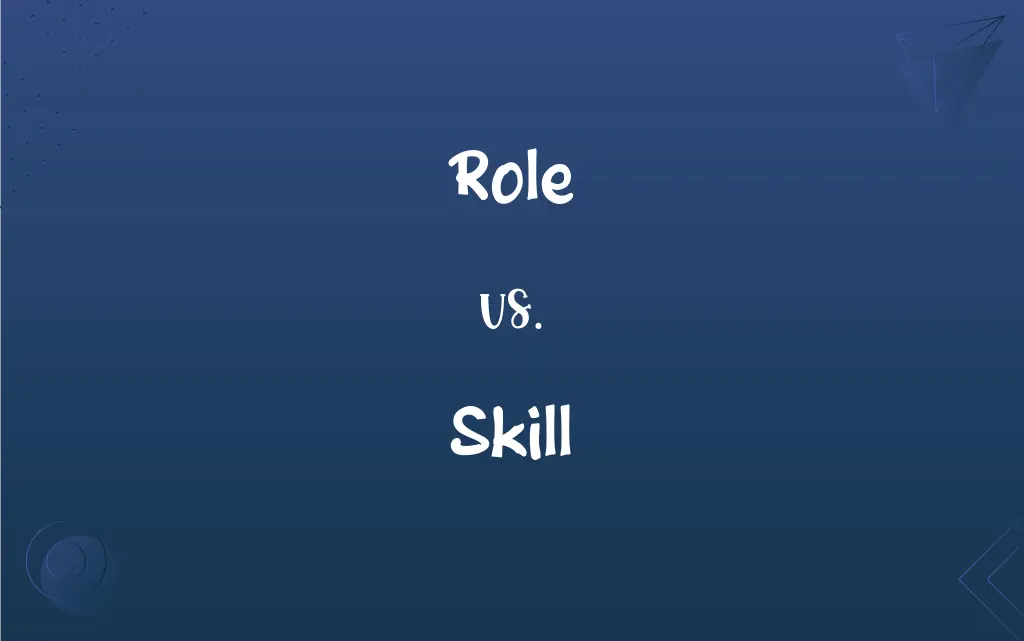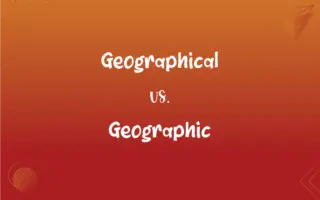Role vs. Skill: What's the Difference?
Edited by Aimie Carlson || By Janet White || Updated on September 29, 2023
Role refers to the specific function or position that someone has within an organization or situation, while skill is the ability to perform a specific task well, often acquired through training or experience.

Key Differences
A role is essentially a set of responsibilities or duties that a person is expected to perform within a certain context, such as in a job or social setting. A skill, on the other hand, is a specific capability or know-how that enables a person to execute a task well.
While a role often encompasses multiple tasks and expectations, a skill is more narrow and task-specific. For instance, a role might require someone to manage a team, whereas a skill might be the ability to communicate effectively with team members.
In a job setting, the role one assumes often determines what skills are needed for successful performance. For example, a manager's role requires organizational skills, while an artist's role requires creative skills.
Roles and skills intersect but are not interchangeable. A role can require multiple skills, and a single skill can be useful in multiple roles. For example, the skill of time management is crucial for roles ranging from a CEO to a college student.
Furthermore, a role is often defined externally by societal norms or organizational rules, whereas a skill is internal to the individual, acquired through training and experience. You can change your role in different settings, but your skills generally remain with you.
ADVERTISEMENT
Comparison Chart
Meaning
Function or position within a context
Ability to perform a specific task well
Scope
Broad, covers multiple tasks
Narrow, task-specific
Requirement
Defined by societal norms or organizational rules
Acquired through training or experience
Transferability
Changes with context
Generally remains with the individual
Applicability
Context-specific
Can be applied in multiple contexts
ADVERTISEMENT
Role and Skill Definitions
Role
A function or position in a specific setting.
Her role in the company is the Chief Financial Officer.
Skill
Competence or expertise in a particular field.
His skill in programming landed him a great job.
Role
A part played in a particular situation.
His role in the project was minor but important.
Skill
A specific capability required for a task.
Cooking is a useful skill.
Role
A character assumed in a play or film.
He auditioned for the leading role in the musical.
Skill
A talent or knack for a particular activity.
She has a skill for playing the violin.
Role
The behavioral expectations of a social position.
The role of a parent is multifaceted.
Skill
Proficiency, facility, or dexterity that is acquired or developed through training or experience
Painted with great skill.
Role
A duty or responsibility in a given context.
Her role in the family is the primary caregiver.
Skill
A developed talent or ability
Improved his writing skills.
Role
Also rôle A character or part played by a performer.
Skill
An art, trade, or technique, particularly one requiring use of the hands or body
The skill of glassmaking.
Role
The characteristic and expected social behavior of an individual.
Skill
(Obsolete) A reason; a cause.
Role
A function or position.
Skill
Capacity to do something well; technique, ability. Skills are usually acquired or learned, as opposed to abilities, which are often thought of as innate.
Where did you pick up that skill?
With great skill, she navigated through the tricky passage.
Doing that coaching course not only taught me useful skills on the field, but also some important life skills.
Role
(Linguistics) The function of a word or construction, as in a sentence.
Skill
(obsolete) Discrimination; judgment; propriety; reason; cause.
Role
A character or part played by a performer or actor.
My neighbor was the lead role in last year's village play.
Her dream was to get a role in a Hollywood movie, no matter how small.
Skill
(obsolete) Knowledge; understanding.
Role
The expected behaviour of an individual in a society.
The role of women has changed significantly in the last century.
Skill
(obsolete) Display of art; exercise of ability; contrivance; address.
Role
The function or position of something.
Local volunteers played an important role in cleaning the beach after the oil spill.
What role does the wax in your earhole fulfill?
Skill
Great, excellent.
Role
Designation that denotes an associated set of responsibilities, knowledge, skills, and attitudes
The project manager role is responsible for ensuring that everyone on the team knows and executes his or her assigned tasks.
Skill
(transitive) To set apart; separate.
Role
(grammar) The function of a word in a phrase.
Skill
To discern; have knowledge or understanding; to know how (to).
Role
(object-oriented) In the Raku programming language, a code element akin to an interface, used for composition of classes without adding to their inheritance chain.
Skill
To know; to understand.
Role
A part, or character, performed by an actor in a drama; hence, a part of function taken or assumed by any one; as, he has now taken the rôle of philanthropist.
Skill
(intransitive) To have knowledge or comprehension; discern.
Role
The actions and activities assigned to or required or expected of a person or group;
The function of a teacher
The government must do its part
Play its role
Skill
(intransitive) To have personal or practical knowledge; be versed or practised; be expert or dextrous.
Role
An actor's portrayal of someone in a play;
She played the part of Desdemona
Skill
To make a difference; signify; matter.
Role
What something is used for;
The function of an auger is to bore holes
Ballet is beautiful but what use is it?
Skill
(video games) To spend acquired points in exchange for skills.
Role
Normal or customary activity of a person in a particular social setting;
What is your role on the team?
Skill
Discrimination; judgment; propriety; reason; cause.
For great skill is, he prove that he wrought.
Skill
Knowledge; understanding.
That by his fellowship he color mightBoth his estate and love from skill of any wight.
Nor want we skill or art.
Skill
The familiar knowledge of any art or science, united with readiness and dexterity in execution or performance, or in the application of the art or science to practical purposes; power to discern and execute; ability to perceive and perform; expertness; aptitude; as, the skill of a mathematician, physician, surgeon, mechanic, etc.
Phocion, . . . by his great wisdom and skill at negotiations, diverted Alexander from the conquest of Athens.
Where patience her sweet skill imparts.
Skill
Display of art; exercise of ability; contrivance; address.
Richard . . . by a thousand princely skills, gathering so much corn as if he meant not to return.
Skill
Any particular art.
Learned in one skill, and in another kind of learning unskillful.
Skill
To know; to understand.
To skill the arts of expressing our mind.
Skill
To be knowing; to have understanding; to be dexterous in performance.
I can not skill of these thy ways.
Skill
To make a difference; to signify; to matter; - used impersonally.
What skills it, if a bag of stones or goldAbout thy neck do drown thee?
It skills not talking of it.
Skill
An ability that has been acquired by training
Skill
Ability to produce solutions in some problem domain;
The skill of a well-trained boxer
The sweet science of pugilism
Skill
The ability to do something well, usually gained through training or experience.
Her skill in negotiation was remarkable.
Skill
Mastery over a particular technique.
His skill in woodworking was evident in his crafts.
FAQs
What is a skill?
A skill is an ability to perform a specific task well.
What is a role?
A role is a specific function or position within a given context.
Can a skill be useful in multiple roles?
Yes, many skills like communication can be applied in various roles.
Is a role defined externally?
Generally, a role is defined by societal norms or organizational rules.
Can a role require multiple skills?
Yes, a role often requires multiple skills for effective performance.
Can a role change?
Yes, roles can change depending on the context or situation.
Are skills more specific than roles?
Skills are usually more task-specific and narrower in scope than roles.
Can one person have multiple roles?
Yes, an individual can assume multiple roles in different contexts.
Can skills be transferred?
Skills are generally transferable across different roles and contexts.
Is skill talent?
Talent may influence skill, but skills are generally developed through practice.
Are roles permanent?
Roles can be temporary or long-term, depending on the context.
Is a skill internally acquired?
Yes, a skill is acquired through training or experience.
How do roles and skills relate?
Roles often determine what skills are needed, and skills enable effective performance in roles.
Are roles more general than skills?
Roles are generally broader and can encompass multiple tasks and skills.
Can one person have multiple skills?
Absolutely, an individual can possess a variety of skills.
About Author
Written by
Janet WhiteJanet White has been an esteemed writer and blogger for Difference Wiki. Holding a Master's degree in Science and Medical Journalism from the prestigious Boston University, she has consistently demonstrated her expertise and passion for her field. When she's not immersed in her work, Janet relishes her time exercising, delving into a good book, and cherishing moments with friends and family.
Edited by
Aimie CarlsonAimie Carlson, holding a master's degree in English literature, is a fervent English language enthusiast. She lends her writing talents to Difference Wiki, a prominent website that specializes in comparisons, offering readers insightful analyses that both captivate and inform.































































